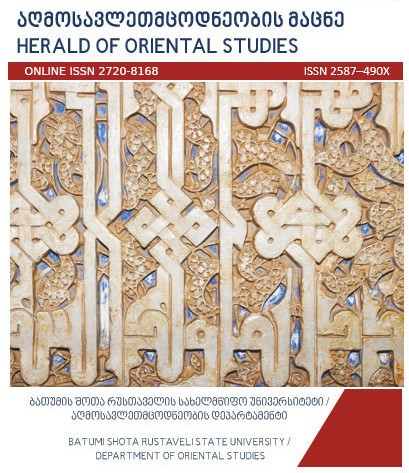ენა როგორც საერთაშორისო ურთიერთობების ინსტრუმენტი დიპლომატიურ დისკურსში და მისი თარგმანის თავისებურებანი
Language as an instrument of international relations in diplomatic discourse and the peculiarities of its translation
Author(s): Lasha BolkvadzeSubject(s): Language studies, Foreign languages learning, Applied Linguistics, Politics and communication, Philology, Translation Studies
Published by: ბათუმის შოთა რუსთაველის სახელმწიფო უნივერსიტეტი, ჰუმანიტარული მეცნიერებატა ფაკულტეტის აღმოსავლეთმცოდნეობის დეპარტამენტის „ელექტრონული ჟურნალი“.
Keywords: Translation; Diplomatic Language; Discussion;
Summary/Abstract: A study of the linguistic peculiarities of diplomatic discourse, the analysis of numerous examples revealed that the peculiarities of diplomatic discourse and translation are characterized by pragmatic and linguistic nuances. From the types of discourse, diplomatic discourse has a greater status and responsibility than other discourses. Whereas without successful, well-paved diplomacy it would have been almost impossible to establish peace and normal political or economic international relations in any epoch, and so it is now. The role of translation in diplomatic discourse is given the greatest attention inside and outside the country. The translation of various political and diplomatic discourses revealed the following features at the level of translational transformation.Diplomatic discourse, generally modern translation studies, requires adequate translation.It is therefore important to find out the competence of the translator, as to how competent and knowledgeable is she, in the history, culture and geography of the target language country.Because in many cases uncertainty is caused by intercultural ignorance.Thus, in order for the dialogue between the representatives of different countries to be successful, it is necessary not only to have a perfect knowledge of the language, but also to overcome the cultural and linguistic barriers of the country.The translation practice of the world in different countries once again indicates that the translator in this field must be deeply knowledgeable and competent in the field in which he does translation.
Journal: საერთაშორისო სამეცნიერო ჟურნალი „აღმოსავლეთმცოდნეობის მაცნე“
- Issue Year: 3/2020
- Issue No: 1
- Page Range: 145-150
- Page Count: 6
- Language: Georgian

